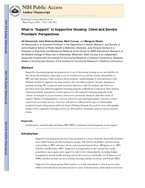Found 3 resources.
0
0
0
Treating opioid use disorder among homeless families can reduce hepatitis C transmission, infant drug withdrawal, and overdose, which is the leading cause of death among people experiencing homelessness. Although office-based treatment is effective for homeless patients, homelessness (especially among families) creates barriers to office-based opioid treatment, such as stigma, child care needs, or distance from an office site. To reduce barriers to treatment, the Family Team at the Boston Health Care for the Homeless Program added a shelter-based opioid treatment program to its outreach...
Topics: Health, Homelessness, Housing, Place-based, Preventative care, Safety, Stability, Substance abuse
0
0
0
Supportive housing programs are proposed as a way of increasing housing access and stability for the chronically homeless, improving access to needed services, and decreasing vulnerability to HIV and other diseases. Little is known about residents’ understandings of and experiences with different models of supportive housing and how they fit within residents’ broader strategies to maintain housing. We conducted semi-structured interviews with 23 residents and 10 service providers from nine different supportive housing programs in Hartford, Connecticut. Data analysis explored residents’...
Topics: East Coast, Homelessness, Housing, Mental health, Place-based, Research, Substance abuse, Supportive housing
 Shared by Housing Is
on Jul 23, 2018
Shared by Housing Is
on Jul 23, 2018 0
0
0
Time and again, taking a narrow view of health care has proven ineffective in producing meaningful change. Yet the current
thrust of health care reform remains firmly focused on traditional health care services. Reforms such as care coordination models and patient centered medical homes are necessary but insufficient for homeless populations with complex problems. Pairing such reforms with supportive housing is more likely to result in lasting health improvements and reduced costs.
Topics: Cost effectiveness, East Coast, Health, Homelessness, Housing, Legislation & Policy, Medicaid / Medicare, Place-based, Supportive housing
 Shared by Housing Is
on Jul 23, 2018
Shared by Housing Is
on Jul 23, 2018 

